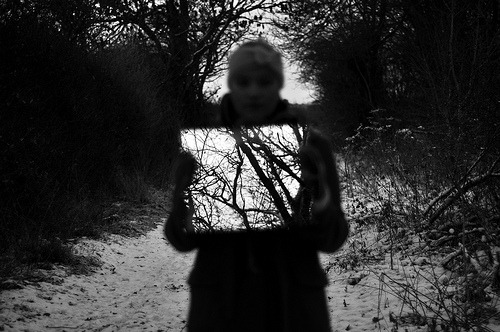Hei Matau Hook Pendant
I once read a book by a wise author who gave prospective writers this piece of advice: Don't worry too much about your opening five pages, let alone your opening paragraph, when you write your initial rough draft. Then she added the zinger:
Your opening will be the last thing to fall into place.
In some ways an opening line is something that we ought to mull over and think upon as we write the whole manuscript. Perhaps we think we know at the outset what that opening will be; but more often than not, our opening line ends up as the finishing touch.
I think we often must come full circle in our manuscript before we know where the tale must truly begin. Then we must polish that beginning so that the opening line - often known as The Hook - does just that: hook our readers and pull them irresistibly into our tale.
What makes a good hook? For me, an excellent hook is like the stylized Maori fishhook shown above - simple, purposeful, but with the promise of meaningful intricacies to come. But sometimes it is more vague, if not impossible to define, since what entrances one person often repulses another. Right now it seems all the rage to begin a book at a point of intense action or violence. Those are the books I put down immediately, without ever getting off the first page. I'm from a more classical tradition, I guess; I want to know my characters before they plunge into their first fight.
A good way to judge a strong opening "hook" is to peruse famous opening lines. There is, of course, an abundance of material to draw from; but I have taken the time to compile a
short list of famous first lines from literature. Some of these seem old and stuffy to modern readers. The third has been touted in some circles as the worst opening line in literature
ever. Yet many of these books have remained on reading lists for decades, even a century or more. I think their opening lines are part of that overall allure that keeps these books in our mind's eye, even when current tastes would toss them out in favor of other tomes.
My personal favorites, and what I consider perhaps the best openings to any book, are the first two samples listed.
NOTE: This is
not an exhaustive list - not by a long shot. Below is just a sample, to read over and to think on....and perhaps, even to learn from.
FAMOUS FIRST LINES
One warm night four children stood in front of a bakery. No one knew them. No one knew where they had come from. (The Boxcar Children)
If I had cared to live, I would have died. (Silverlock)
It was a dark and stormy night. (A Wrinkle in Time)
Scarlett O'Hara was not beautiful… (Gone with the Wind)
Kino awakened in the near dark. (The Pearl)
Mr. and Mrs. Mallard were looking for a place to live. (Make Way for
Ducklings)
It was a bright cold day in April, and the clocks were
striking thirteen. (1984)
It was a pleasure to burn. (Fahrenheit 451)
Even in high summer, Tintagel was a haunted place… (Mists of
Avalon)
It was Wang Lung's marriage day. (The Good Earth)
All children, except one, grow up. (Peter Pan)
Now, what I want is Facts. (Hard Times)
Marley was dead, to begin with. (A Christmas Carol)
It is a truth universally acknowledged, that a single man in
possession of a good fortune, must be in want of a wife. (Pride and Prejudice)
In an old house in Paris
that was covered with vines lived twelve little girls in two straight lines.
(Madeline)
The great fish moved silently through the night water,
propelled by short sweeps of its crescent tail. (Jaws)
As I walked through the wilderness of this world, I lighted
on a certain place where was a Den, and I laid me down in that place to sleep…
(Pilgrim’s Progress)
I am always drawn back to the places where I have lived, the
houses and their neighborhoods. (Breakfast at Tiffany’s)
Alice
was beginning to get very tired of sitting by her sister on the bank, and of
having nothing to do. (Alice
in Wonderland)
These two very old people are the father and mother of Mr.
Bucket. (Charlie and the Chocolate Factory)
The boy with fair hair lowered himself down the last few
feet of rock and began to pick his way towards the lagoon. (Lord of the Flies)
This is my favorite book in
all the world, though I have never read it. (The Princess Bride)
Ships at a distance have every man's wish on board. (Their
Eyes were Watching God)
When he was nearly thirteen, my brother Jem got his arm
badly broken at the elbow. (To Kill a Mockingbird)
A throng of bearded men, in sad-colored garments and gray,
steeple-crowned hats, intermixed with women, some wearing hoods, and others
bareheaded, was assembled in front of a wooden edifice, the door of which was
heavily timbered with oak, and studded with iron spikes. (The Scarlet Letter)
It was the best of times, it was the worst of times, it was
the age of wisdom, it was the age of foolishness, it was the epoch of belief,
it was the epoch of incredulity, it was the season of Light, it was the season
of Darkness, it was the spring of hope, it was the winter of despair, we had
everything before us, we had nothing before us, we were all going direct to
Heaven, we were all going direct the other way… (A
Tale of Two Cities)
Like I said --- a very basic list, which could easily be expanded into the hundreds.
What do YOU consider the best opening line of a book?




